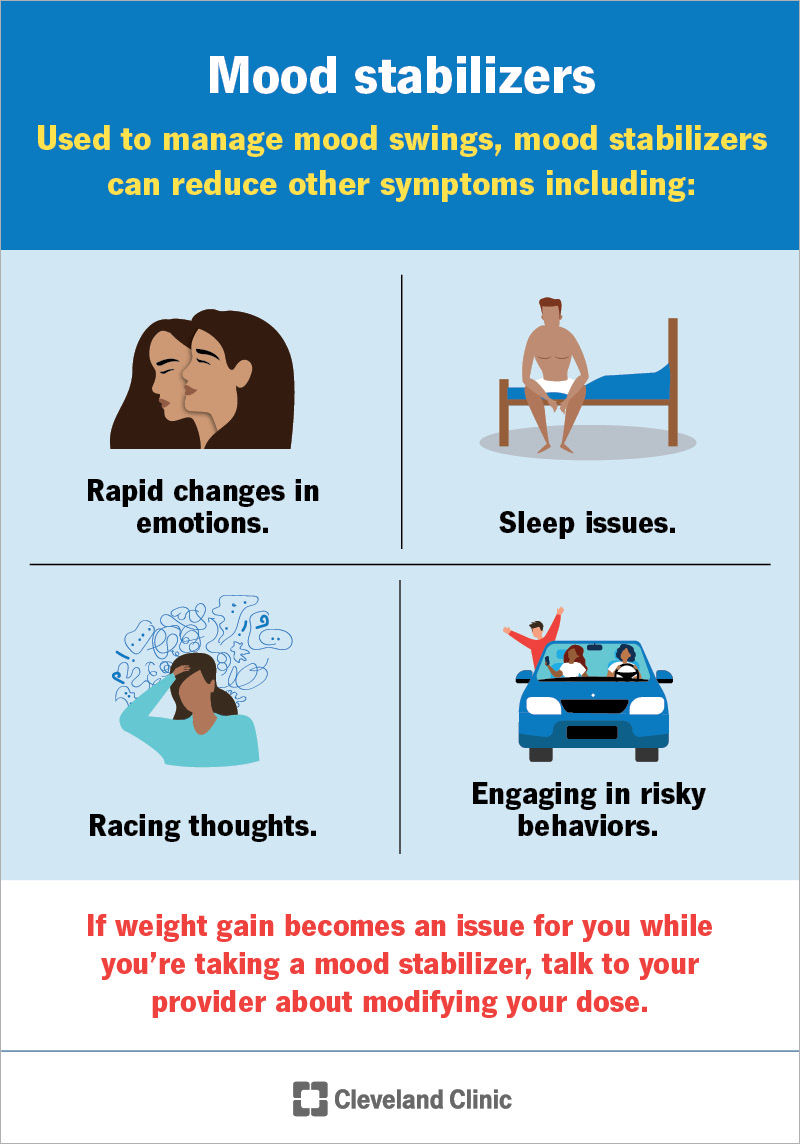Mood stabilizers are medications that healthcare providers use to treat bipolar disorder and other mental health conditions. They specifically work for people with bipolar disorder by helping manage the high (manic) and low (depressive) mood swings that occur with the disorder. Mood stabilizers include lithium, anticonvulsants and antipsychotics.
Advertisement
Cleveland Clinic is a non-profit academic medical center. Advertising on our site helps support our mission. We do not endorse non-Cleveland Clinic products or services. Policy

Image content: This image is available to view online.
View image online (https://my.clevelandclinic.org/-/scassets/images/org/health/articles/mood-stabilizers)
Mood stabilizers are a group of medications that healthcare providers use to treat symptoms of bipolar disorder, a condition where individuals have both manic and depressive episodes. Mood stabilizers can help reduce many symptoms of mania, including rapid changes in emotions, sleep difficulties, racing thoughts and engaging in risky behaviors. They can also help prevent these symptoms from returning and the need for more intense treatment, like hospitalization.
Advertisement
Cleveland Clinic is a non-profit academic medical center. Advertising on our site helps support our mission. We do not endorse non-Cleveland Clinic products or services. Policy
While healthcare providers prescribe mood stabilizers most commonly to treat bipolar disorder, they may also use them to treat other mental health conditions, including:
Mood stabilizers work by affecting certain receptors in your brain that regulate the release and maintenance of neurotransmitters. It’s thought that by modulating this activity, mood stabilizers can improve symptoms of bipolar disorder, as well as other psychiatric conditions.
You may need to take mood stabilizers for several weeks before you start to notice the effects. You may notice slight changes at first and then a greater effect after you’ve taken the medication consistently for a longer period of time.
There are three main types of mood stabilizers. Common mood stabilizers include lithium, anticonvulsants and antipsychotics.
Lithium is a naturally occurring element and has been approved by the U.S. Food and Drug Administration (FDA) as a mood stabilizer since 1970. Brand names for lithium include:
High levels of lithium in your blood can be dangerous. So, if you take lithium, your healthcare provider will routinely monitor your health through blood tests.
Advertisement
Also called antiseizure medications or antiepileptic medications, anticonvulsants were originally developed to treat seizure disorders like epilepsy. Researchers found that the medications can also treat symptoms of bipolar disorder. Common anticonvulsants that providers use to treat bipolar disorder include:
Other medications can also be used to treat various symptoms of bipolar disorder. These can belong to other classes of medications such as benzodiazepines, antipsychotics and antidepressants.
Mood stabilizer side effects will vary based on which kind you’re taking. Many of these side effects tend to go away as your body adjusts to the medication. Talk to your healthcare provider if they don’t subside or start to interfere with your quality of life.
Mood stabilizers aren’t addictive in the traditional sense. But many people who take them do so for long periods of time — like months or years. When your brain gets used to a mood stabilizer, it’ll take some time to adjust when you stop — especially if you stop taking them suddenly. Your symptoms might come back. Or you might feel like you’re going through withdrawal. These effects are usually mild, but it’s always important to talk to your healthcare provider before you stop taking these or any other prescription medication.
Your healthcare provider can help determine if mood stabilizers are right for you. The decision to try a mood stabilizer will depend on many factors, including:
If your healthcare provider has found that mood stabilizers work for you for the treatment of bipolar disorder, you’ll most likely need to take the medication throughout your life. Similar to how a person with diabetes has to take insulin every day, bipolar disorder is a lifelong condition and you’ll need to take a mood stabilizer every day. People who take mood stabilizers for other mental health conditions like depression may only need to take them for a limited time — several weeks or months — depending on their individual situation.
Mood stabilizers are used primarily for treating bipolar disorder. While they can be helpful, the term “mood stabilizer” is kind of a misnomer because the drugs don’t actually cure your mood swings. You may still have mood swings, but they won’t be quite as severe. So, don’t stop taking your medication because you think it’s not working. It may be working, just not in the way you’d expect. Talk to your healthcare provider if you have any questions or concerns.
Advertisement

Sign up for our Health Essentials emails for expert guidance on nutrition, fitness, sleep, skin care and more.
Learn more about the Health Library and our editorial process.
Cleveland Clinic’s health articles are based on evidence-backed information and review by medical professionals to ensure accuracy, reliability and up-to-date clinical standards.
Cleveland Clinic’s health articles are based on evidence-backed information and review by medical professionals to ensure accuracy, reliability and up-to-date clinical standards.
Your mental well-being is just as important as your physical well-being. Cleveland Clinic’s mental health experts can help you live life to the fullest.
